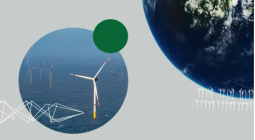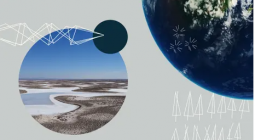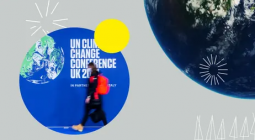Cop26: Obama criticises China and Russia for ‘dangerous absence of urgency’ – day eight as it happened
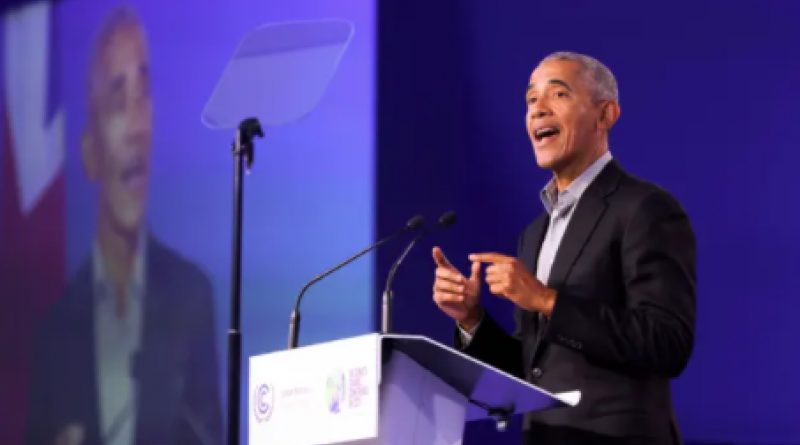
Day eight at the Glasgow summit focuses on loss, adaptation and damage
That’s me done for today!
Here is the evening summary of today’s events:
- The legitimacy of the Cop26 climate summit was called into question by a number of organisations who said restrictions on access to negotiations were unprecedented.
- The fossil fuel industry has the largest delegation at Cop26, according to campaigners, who say the sector has more people attending than any other country. Analysis of the UN’s provisional list of attendees suggests that 503 delegates have affiliations to oil gas or coal firms.
- Barack Obama called on world leaders to “step up now” and criticised China and Russia for a “dangerous absence of urgency” on the climate crisis.
- But China is doing more for the climate than it’s given credit for, according to a senior Beijing adviser who said the country already has concrete actions in place, not distant targets like other countries.
- Meanwhile, protesters gathered in Glasgow for the Scientist Rebellion protest. One academic said that not acting on the climate crisis “might just be the worst crime in human history”.
- Police broke into a building providing shelter for climate activists and delegates in the early hours of this morning, occupants say.
- Survivors of extreme weather associated with the climate crisis have been speaking out at Cop26 on the day the summit focuses on “loss and damage”.
- Rich countries’ refusal to discuss loss and damage is “diplomatic bullying”, says Bolivia’s chief negotiator, Diego Pacheco Balanza.
- Rich countries must also come up with emissions reduction plans and money to help developing nations deal with the climate emergency, says the European Commission vice-president Frans Timmermans.
- Finally, African nations want to start open discussions at Cop26 about channeling $700bn (£520bn) every year from 2025 to help them deal with the climate crisis.
I leave you with the news that Glenfiddich distillery has created a limited-edition 26-year-old whisky to commemorate Cop26. There will be a charity auction later this month, with all proceeds going to Stop Climate Chaos Scotland.
Have a great evening.
Phoebe
*****
Jonathan Watts
African nations want Cop26 to open discussions this week on a mega-financing deal that would channel $700bn (£520bn) every year from 2025 to help developing nations adapt to the climate crisis.
Tanguy Gahouma-Bekale, the chair of the African Group of Negotiators on climate change, said the increased finance was needed for the accelerated phase of decarbonisation required to hold global heating to 1.5C.
He said: “The work on this needs to start now ... Talks about finance take time so we need to have a roadmap now with clear milestones on how to achieve targets after 2025 to ensure the money flows every year.”
******
EU climate envoy calls for rich countries to come up with emissions reduction plans
Jennifer Rankin
The European Union’s most senior climate envoy has called on other rich countries to come up with emissions reduction plans and money to help developing nations deal with the climate emergency.
The European Commission vice-president Frans Timmermans said he hoped to convince other major emitters “not just to declare a date for carbon neutrality or climate neutrality” but come forward with policies to achieve it.
Since the EU agreed its net zero goal in 2019, it has proposed a vast set of legal proposals to transform the European economy, although the measures are yet to be agreed by the EU member states and European parliament.
Timmermans said: “If we don’t make a success of this Cop, it’s difficult to see how we can reduce [in] half the emissions in less than ten years. It needs to happen right now.”
******
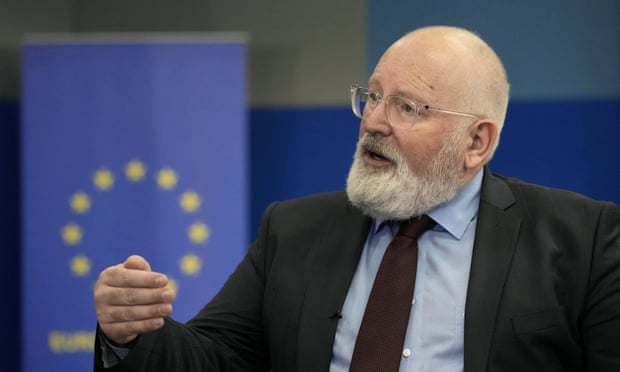
Earlier in the day, the veteran Dutch MEP Bas Eickhout sounded a note of caution on climate pledges unveiled last week, which suggested the world could restrict global heating to below 2C.
“We all have to acknowledge there is a huge difference in the value of these pledges,” he said “Some pledges are really serious, for example the EU with its Fit for 55 package. But for example the pledge of Australia is literally a brochure.”
Timmermans, a former Dutch foreign minister, also called on wealthy countries to close the gap in fulfilling a long-standing promise to mobilise $100bn a year to help developed countries deal with the climate crisis. “We have been doing our share as the EU … I am not complacent at all but I am just saying to the other developed countries if we can do our share I am sure you can do your share,” he said.
We all have to acknowledge there is a huge difference in the value of these pledges. Some pledges are really serious, for example the EU with its Fit for 55 package. But for example the pledge of Australia is literally a brochure.
Timmermans didn’t name names, but it’s no secret that the EU expects the United States to go far beyond Joe Biden’s recent goal to aim for an $11.4bn contribution by 2024.
But the EC vice president was also challenged on the EU’s own leadership credentials, when the Guardian’s Fiona Harvey asked him about countries such as Poland and Germany that planned to keep coal in their energy mix for some years to come.
Timmermans conceded that coal was a big challenge, but insisted the EU was making progress, citing ongoing talks in Germany to form a governing coalition that could speed up the coal phase out, as well as changes in Poland’s stance on energy.
“Things are speeding up for political reasons, for climate reasons but also simply because coal doesn’t have a future,” he said.
*******
Youth climate activists: Can Cop26 save the world?
Guardian Live is holding a special live stream event with young climate activists from around the world on Wednesday 10 November 2021, 8pm GMT. It will be hosted by the film director Franny Armstrong. Tickets are available here
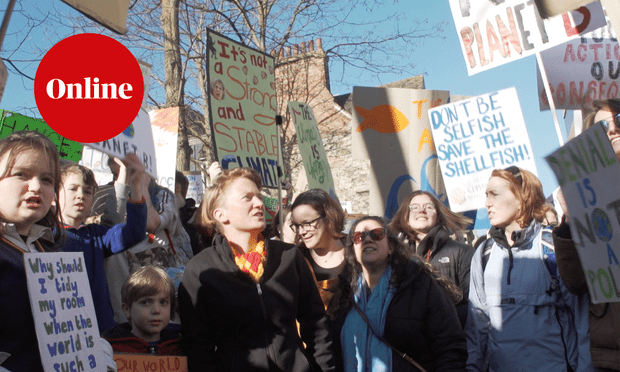
Nina Lakhani
In an interview with the Guardian, Bolivia’s chief negotiator, Diego Pacheco Balanza, blasted the refusal by rich countries to discuss loss and damage or compensation at Cop26 as evidence of “diplomatic bullying”.
“There’s been a systematic attempt by developed countries to remove all discussion about responsibility, compensation and direct climate finance from the negotiations, it’s shameful,” he said. “Instead, they want us to focus on carbon markets and their 2050 net zero narrative which is completely meaningless. The net zero narrative is a big lie. We need to eliminate greenhouse gasses now, not in 30 years.”
Net zero has been condemned by the vast majority of civil society groups, social movements and indigenous people as climate denialism as it allows polluting countries and corporations to offset carbon emissions rather than stop emitting them.
Pacheco added: “We reject the narrative that the market is the solution. We want to focus on strengthening direct cooperation from developed countries to developing countries. They only want to talk about loans, but we want direct aid and the transfer of knowledge and technologies. They don’t want to discuss loss and damage, only mitigation through forests which will serve as an instrument for carbon credits.”
In response to the first draft of the Glasgow decision text, published today, which contains no mention of phasing out fossil fuels, Pacheco said: “It shows how developed countries are trying to impose the net zero and carbon markets narrative, it’s a form of diplomatic bullying. They are always trying to destroy what’s been achieved at previous climate negotiations and start again, so we never move forward.”
It should be noted that the governing party has been previously criticised by activists for passing legislation that incentivised farmers to burn forests in order to open up new land to farming and cattle.
Here is George Monbiot’s take on this:
*****
'I feel so tired of just fleeing': Survivors of the extreme weather speak out
Damian Carrington
Survivors of the extreme weather impacts of the climate crisis have been speaking out at Cop26 on the day the summit focuses on “loss and damage” – the phrase used for the unavoidable and increasing harm from global heating.
“When the death toll reached 6,300 they stopped counting,” said Marinel Ubaido, the Philippines and a survivor of super typhoon Haiyan, which hit eight years ago today. “There are still 1,600 plus dead bodies missing.”
“Today we’re still shouting for justice for our friends and families who have lost their lives,” she said. “We are fighting for a future that is not riddled with anxiety and fear that another Haiyan might come anytime. We do not deserve to live in fear. We deserve a hopeful future. We demand urgent action.”
Many people remain in the same vulnerable places, Ubaido said, as their livelihoods are there. “I feel so tired of just fleeing and evacuating and then I don’t even know if we will have a house to go back to.”
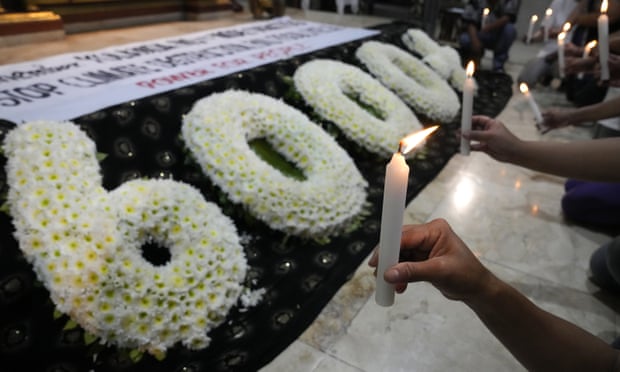
Jo Dodds, from the small coastal town of Tarthra, in New South Wales, Australia, said 69 of its 400 homes have been destroyed by wildfires since 2018: “Since then, I have lived in fear. It’s destroying our communities, it’s killing our people.
“People talk about bushfire being a normal aspect of Australian climates, but I can tell you these are not,” she said. “There is nobody who isn’t extremely alarmed at the catastrophic heat and speed and unpredictability of these fires. We’ve had fires during the winter with snow on the hills behind us that went on for seven weeks.”
Dodds said: “Australia should be stepping up to help developing countries who are feeling the impact of climate change even more profoundly than we are. But it’s not even helping its own people.”
It’s destroying our communities, it’s killing our people.
Sven Harmeling, at the NGO Care, said loss and damage has been part of Cop discussions for at least eight years, but was not getting the serious attention it needs: “Developing countries still need to fight over whether to [even] have an agenda item or not.
“There must be clear progress on loss and damage and identifying new sources of finance,” he said. “Without that, this Cop cannot be a successful response to climate injustice. This is absolutely required to help stop this climate madness.”
Yamide Dagnet, at the World Resources Institute, said: “The ostrich policy, from developed countries who hide behind the fear of liability and compensation, has not worked and is not working.” She noted that Tuvalu and Antigua and Barbuda have said they may sue to get the money.
Lisa Plattner, at WWF-Austria said the economic impacts of global heating are estimated at $290bn to $580bn a year up to 2030. She said it was down to Alok Sharma and the UK presidency to make progress happen this week: “This is the time of the presidency.”
****
Jessica Murray
The occupants of a squatted building in Glasgow, which was occupied to provide emergency accommodation for climate activists and delegates, have accused police of trying to break into their site with a battering ram early on Monday morning.
The activists at Baile Hoose, a derelict homeless shelter in the Tradeston district, said up to 20 officers from the Metropolitan police and Welsh forces mounted the raid at 3am, claiming to be acting under the orders of the Scottish police.
The activists said Police Scotland officers arrived before those involved in the raid entered the squatted parts of the complex and “calmed the situation. [It] was only then that the Met and Welsh police backed off”.

One occupant said: “Baile Hoose has provided a safe home and meals for hundreds of activists during this summit. There have been a lot of people who have travelled here from all over the world and the country, and quite often people from marginalised communities are not getting their voices heard.”
Glasgow city council, which owns the building, asked the activists to leave last week, warning its water supply could be unsafe, and the building could contain asbestos.
A police spokesperson said: “Around 3am on Monday 8 November, officers attended at a property on Centre Street, Glasgow, following concerns for the safety and security of those using the building. Officers will continue to engage with those currently in the property.”
Jessica Murray
Just as Obama finishes his speech in the blue zone, a large crowd has gathered on the south side of King George V bridge in Glasgow for a Scientist Rebellion protest.
The group has been banned from the city centre after blocking the bridge over the weekend, when 21 activists were arrested.
“It was the first mass arrest of scientists over the climate crisis in history,” said theoretical physicist Mike Lynch-White, one of those arrested. He said the protest was the first disruptive action during the summit that wasn’t preemptively stopped by the police.
“We were banned from the centre of Glasgow even though all we were trying to do is non-violently disobey and prevent climate collapse. It’s not proportionate, it’s not reasonable,” he said.
****

“There are people all over Glasgow right now making choices which are going to lead to enormous human suffering but it’s the people who are trying to highlight that facing restrictions and loss of freedom,” said astrophysicist Dr Tim Hewlett. “On an individual level the police have been quite decent to us, but I’m sure that’s mainly because we are wearing white [lab] coats.”
He said his profession gives him a unique perspective, adding the climate crisis “might not just be the worst crime in human history, it could be the worst crime in the galaxy.”
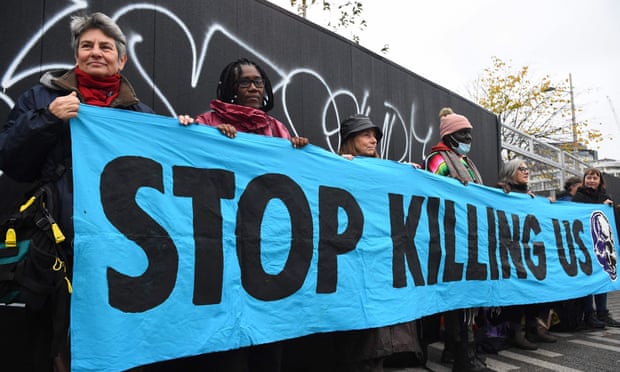
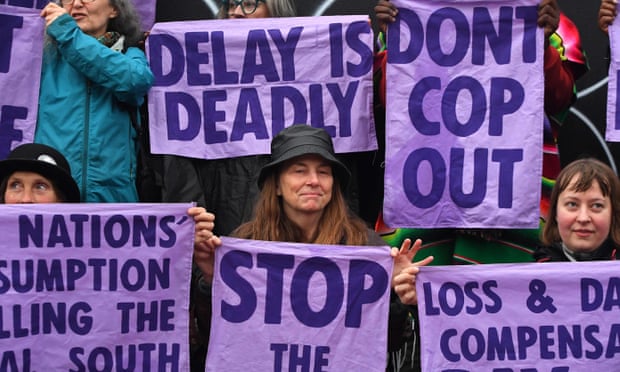
Photograph: Andy Buchanan/AFP/Getty
Oliver Milman
Obama enters the final stanza of his speech by saying that averting disastrous global hearing “will not be easy, it is going to be hard”, citing slow-moving governments, cynical businesses and misinformation spread on social media. “Getting people to work together on a global scale takes time and right now that’s time we don’t have,” he said.
He then launches into a plea to work with those who are indifferent to the climate crisis, or who are affected by the transition to clean energy, and asks those in the room to prepare for messy compromises.
“Gird yourself for a marathon, not a sprint,” he says, before quoting Shakespeare’s Othello: “What wound did ever heal but by degrees?
“Our planet has been wounded by our actions, those wounds won’t be healed today or tomorrow [but] I believe we can secure a better future,” he says. “We have to.
“To all the young people out there, as well as those who consider yourself young at heart, I want you to stay angry. I want you to stay frustrated. But challenge that anger and harness that frustration. Keep pushing harder and harder for more and more – because that is what is required to meet this challenge.”
Obama finishes by saying: “I’m ready for the long haul if you are, so let’s get to work.” There is rapturous applause from the audience.
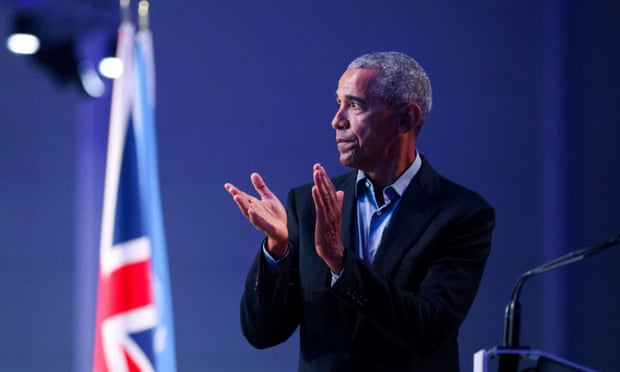
*****
“It is going to be hard,” Obama says about keeping temperatures to below 1.5C.
“International co-operation has always been difficult, it is made more difficult by misinformation and propaganda that comes out of social media these days.
“Getting people to work together on a global scale takes time, and that’s time we don’t have ... If we work hard enough for long enough, those partial victories add up.”
****
Obama tells Cop26 delegates we won’t have more ambitious climate plans without pressure from voters.
“It will not be enough to simply mobilise the converted, it will not be enough to preach to the choir … Protests are necessary to raise awareness, hashtag campaigns can spread awareness,” he said.
He is encouraging young people to speak to their families about climate change because they will listen, saying it’s important to convert people who do not agree, or are indifferent to the issue.
“We have to do a little more listening – we can’t just yell at them or say they’re ignorant, or tweet at them,” he said.
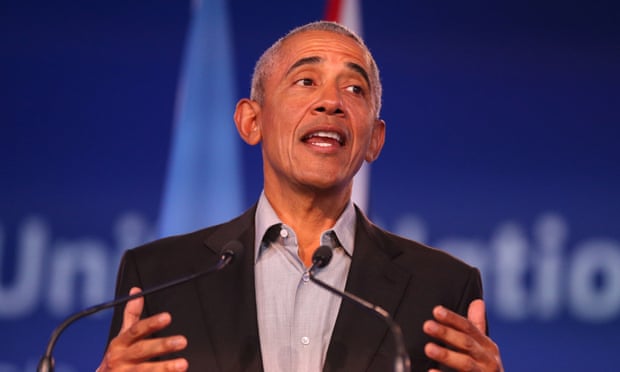
Photograph: Robert Perry/EPA
****
“The most important energy in this movement is coming from young people,” says Obama, who references his two daughters, both in their early 20s.
“The reason is simple – they have more stake in this fight than anyone else. That is why I want to spend the rest of my time today talking to young people.
“If those older people won’t listen, they need to get out the way,” he said.
One youth activist, Alexandria Villaseñor, said lots of young people hadn’t been able to get into the room to hear Obama speak.

Obama criticises China and Russia for 'dangerous absence of urgency'
Barack Obama is currently addressing a very full room, opening with a cheery ‘Hello, Glasgow!’ The former US president, tieless and looking relaxed, says that he doesn’t need to attend such conferences anymore but “you will have a hard time keeping me away” when it comes to the future of the planet.
Obama says that “meaningful progress” has been made since the Paris climate accords, which he helped to strike, but acknowledges that more needs to be done.
“What is also true, collectively and individually we are still falling short,” he says. “We have not done nearly enough to address this crisis, we will need to do more.”
Obama admits that “some progress stalled” when Donald Trump withdrew the US from the Paris deal. “I wasn’t real happy about that,” he adds, but says the “US is back” under Joe Biden’s leadership.
He also believes that, despite opposition within the Democratic party, some version of Biden’s ambitious $555bn climate package will pass in Congress in the coming weeks. “It will set the United States on course to meet its new climate targets,” he says.
In 2015, rapport between Obama administration negotiators and their Chinese counterparts was seen as paving the way to the global Paris accord.
Obama criticised Chinese President Xi Jinping and Russian President Vladimir Putin for not joining other global leaders at the climate talks in Glasgow, saying he found it “particularly disappointing” that their leaders haven’t shown up to Cop26.
He blames the pandemic and the rise of nationalism for a breakdown in international relations that has affected dealing with the climate crisis. He also has a dig at Republicans back home for showing “active hostility” to climate science.”
“One thing should transcend day to day politics and geopolitics and that’s climate change,” Obama says. “The world has to step up and it has to step up now.”
The 44th US president admits that sometimes he feels “bleak” about the future of humanity and that “images of dystopia start creeping into my dreams”. But he called on leaders and activists not to give in to cynicism and praised the work of young climate campaigners, which provokes the first round of applause during his speech.
8 November 2021
The Guardian

